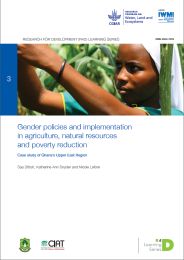Research for Development (R4D) Learning Series – Issue 3
Citation:
Dittoh, S.; Snyder, K. A.; Lefore, N. 2015. Gender policies and implementation in agriculture, natural resources and poverty reduction: case study of Ghana’s Upper East Region. Colombo, Sri Lanka: International Water Management Institute (IWMI). CGIAR Research Program on Water, Land and Ecosystems (WLE). 22p. (WLE Research for Development (R4D) Learning Series 3). [doi: 10.5337/2015.205]
Abstract
Gender mainstreaming in Ghana’s development process has been the policy goal since the early 1990s. Yet, there have been critiques that the rhetoric is far from the reality. How far is policy from real implementation practice and if there is a gap, how big is it? Answers to these questions are crucial given the growing importance of changing gender roles with regards to improvements in the socio-cultural, economic, political, legal and civic conditions of the people. This research and case study was an output of the Gender in National Policy and Implementation in Ghana project supported by the Gender Innovation Fund of the CGIAR Research Program on Water, Land and Ecosystems (WLE). The work intended to provide the foundation for subsequent gender research in the region and for future collaboration with institutions, including ‘non-conventional partners’ such as gender advocacy organizations, many of whom are not presently involved in agricultural development. The overall aim of the project was to analyze how gender is addressed in national policy and implementation of agricultural and natural resources management (NRM) initiatives and how the ideas of gender as represented in the national policies may or may not align with the local context and the aims of men and women at the local level.
The findings suggest that sensitization programs on gender have had some success at all levels in terms of raising awareness. However, the study also revealed that adopting narratives around gender and gender equity into policy and even programs does not necessary lead to implemented projects and activities that increase women’s access to resources, control over assets or greater participation and influence in public and political life. A major obstacle for implementation is lack of funding, which is part of the overall constraints on institutional capacity among implementing bodies. In some cases, donor funds earmarked for more direct support for district level implementation on gender and agriculture have enabled the implementation of plans. There is often a disconnect between how gender as understood and prioritized at national level is interpreted at local level at the point of implementation. Much more can be done to better understand and align notions of and priorities for gender toward achieving equity through policy implementation in northern Ghana.
ISSN 2522-7106 (Print)
ISSN 2522-7076 (Online)
ISBN 978-92-9090-815-9


